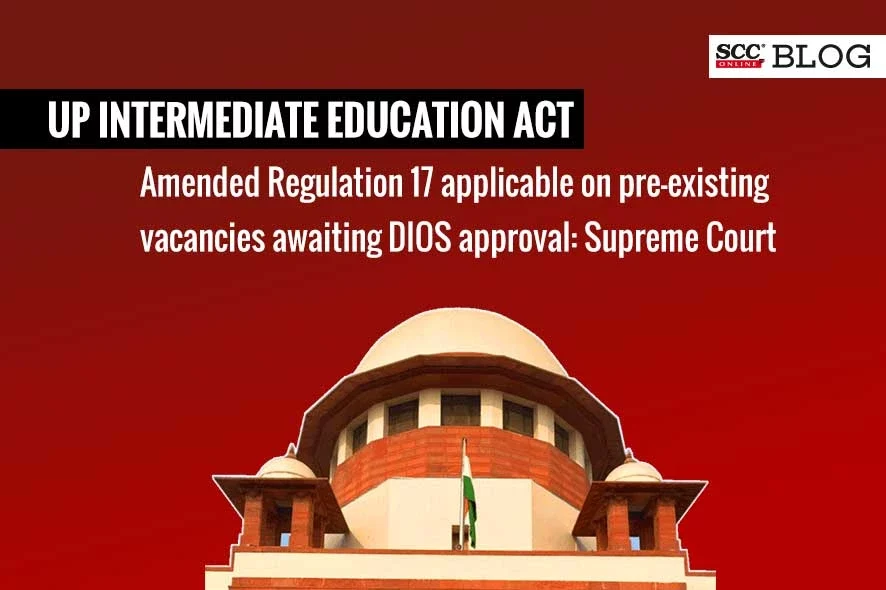Supreme Court: In an appeal by the State against the judgment passed by Single Judge Bench supported by the Division Bench of Allahabad High Court that selection process in educational institutions is to be governed by the Rules in existence when vacancies arose and not the amended Regulations which came into effect when the appointments were awaiting authoritative approval, the Division Bench of Dr Dhananjaya Y Chandrachud, CJI and Pamidighantam Sri Narasimha*, J. allowed the appeal and held that the High Court committed an error in concluding that the respondents have acquired a vested right of appointment.
The Uttar Pradesh Intermediate Education Act, 1921, related Rules and Regulations govern Schools and intermediate educational institutions in Uttar Pradesh. Sub-section (3) of Section 16-FF of Uttar Pradesh Intermediate Education Act, 1921 and Regulation 17 lay the procedure for the selection and appointment of Heads of Institutions and Teachers in minority institutions. It mandates that no person selected as a Teacher shall be appointed unless the proposal for appointment is approved by the District Inspector of Schools (‘DIOS').
Two minority institutions initiated process for selection of Teachers and forwarded their proposals to the DIOS. While the proposal was awaiting DIOS approval, the Government amended Regulation 17 to prescribe a new selection process. The DIOS, thus, returned the previous proposals requiring the Management to follow the new Rules, and the action was challenged through Writs under Article 226 of the Constitution of India.
The Allahabad High Court relied on the principle that vacancies that arise prior to the amendment of Rules must be governed by the existing Rules when such vacancies arose and held that “once the Management forwards the names for approval of the DIOS, the selection process concludes, and the proposed candidates acquire a vested right to be appointed.” The decision has been challenged by the State in the instant matter.
The Court clarified that “the principle relied on by the High Court for applying old rules for past vacancies is neither applicable to the instant matter, nor a good law in view of recent decisions of this Court.” The Court did not find any place for a ‘deemed appointment' and held that the selection process concludes only after the mandatory approval of the DIOS is granted. The Court considered the following issues to decide the matter:
-
Whether the selection process concluded, and the candidates acquired a vested right to be appointed before the amendment of the Regulations?
The Court examined Section 16-FF providing for exception to minority institutions regarding Selection Committee for appointment of a teacher or Head of Institution and expressed that “we have no hesitation in holding that appointment is subject to the mandatory approval of DIOS” while relying on Raj Kumari Cecil v. Laxmi Narain Bhagwati Devi Vidya Mandir Girls’ High School, (1998) 2 SCC 461 and rejected any vested right of the candidate to be appointed. The Court said that the High Court committed an error in concluding that the respondents have acquired a vested right of appointment.
-
Whether the Act, read with the Rules and Regulations, contemplates ‘deemed appointment' if the approval of the DIOS is not given within a period of 15 days?
The Court scrutinized Regulation 18 on the question of approval within 15 days and pointed that appointments are made under Section 16-E, while Section 16-F of the Act deals with constitution and recommendation of Selection Committees and Section 16-FF specifically relates to minority institutions. It provides for issuance of appointments within 15 days of receipt of approval by the authority, not the period within which such approval is to be accorded, and that there is nothing about deemed appointment in case of delay in granting approval. The Court further clarified that “If the statutory provisions read with relevant Regulations were to provide for ‘deemed appointment', there would not have been a further remedy against an order of disapproval by the DIOS.”
-
Whether the posts of teachers could be filled as per the Rules and Regulations that existed when the vacancies arose and not as per the amended Regulations?
The Court relied on the settled principle of law that “a candidate has a right to be considered in the light of existing Rules, which implies Rules in force as on the date of consideration.” as affirmed in Deepak Agarwal v. State of U.P., (2011) 6 SCC 725 and reaffirmed in Rajasthan State Sports Council v. Uma Dadhich, (2019) 4 SCC 316. The Court thereby rejected the contention that appointments must be governed by unamended rules.
The Court set aside the judgments dated 16-1-2019 and 18-1-2019 passed by the Single Judge Bench and Division Bench of High Court.
[State of U.P. v. Rachna Hills, 2023 SCC OnLine SC 506, Judgment dated 27-4-2023]
*Judgment authored by: Justice Pamidighantam Sri Narasimha
Advocates who appeared in this case :
For Appellants: Additional Solicitor General Vikramjit Banerjee, Senior Advocate V.K. Shukla, Advocate on Record Harish Pandey, Advocate Vikas Bansal
For Respondents: Advocate Gaurav Agarwal, Advocate Shristi Gupta, Advocate Sanjeet Paliwal, Advocate S K Garg, Advocate on Record Abhishek Sharma, Advocate on Record Shankey Agrawal, Advocate on Record Vikash Singh, Advocate on Record Jaikriti S. Jadeja






